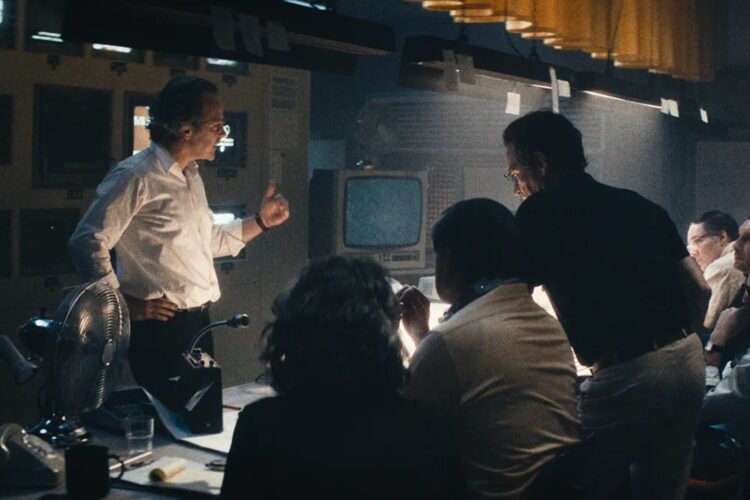

Tim Fehlbaum’s September 5 stars John Magaro, Peter Sarsgaard, Leonie Benesch, and Ben Chaplin as ABC sports journalists unexpectedly put in the position of narrativizing the hostage crisis of the 1972 Munich Olympics. It’s an effective thriller––one couldn’t accuse it of being boring––but takes what feels like the safest possible approach to its fraught subject matter.
September 5 opens with ABC’s vintage logo as a cheerful voice announces these as the first Olympic Games to be broadcast live, promising that the Munich edition will remind the world of what unites us––an irony-loaded statement for those who know what’s coming. The handheld camera follows the ABC journalists as they begin their day in the studio. It is director Geoffrey’s (Magaro) first day on the job. He’s hoping to impress his bosses: the ambitious Roone Arledge (Sarsgaard) and “voice of reason” Marvin (Chaplin). Soon, shocking news arrives––armed men have infiltrated the Olympic Village and taken the Israeli athletes hostage.
The sports reporters, now tasked with shooting live coverage of a dangerous hostage situation, barely flinch. “Our job is simple: put the camera in the right place,” says Roone. This is also Fehlbaum’s MO. His film is well-researched, handsomely shot, genuinely stressful, yet lacking emotion and perspective. With the feel of a mechanical ballet, cinematographer Markus Förderer and editor Hansjörg Weißbrich use quick cuts and frenetic camera work to create a tactile atmosphere of adrenaline and stress.
With such a controlled plot, the performances could have been an opportunity for the filmmakers to infuse emotionality and texture, revealing September 5‘s soul. Magaro, Sarsgaard, Benesch, and Chaplin instead bring a competent professionalism and likable charm that feels bloodless. Magaro and Sarsgaard are engaging as always, yet their recent, more passionate turns––the latter in the underrated Memory, the former’s standout roles in Past Lives and Showing Up—feel worlds away. In a heated hallway scene where Geoffrey, Roone, and Marvin briefly argue about the implications of the live broadcast, there’s a nearly comic quality to their contrived tension as they exchange blank looks in matching square glasses and rolled-up button-downs. While the stress of the moment is clear, what’s missing is the weight: the personal implications and “terrible responsibility of the storyteller” that have been foisted on the characters.
September 5 may aim to represent the uncomfortable ethics of media, but this is no Ace in the Hole. About the final shootout that results in hostage deaths, Marianne (Benesch) tearfully says, “I stood with hundreds of people, waiting for something to happen so we could take a picture of it.” This line is meant to implicate our protagonists as voyeurs, media vultures. Yet this moment doesn’t resonate deeply when the film goes out of its way to cast these characters as blameless. (What can they do? It’s their job!) With a matter-of-fact, procedural tone, September 5 treats journalism as a sport––not one of blood and sweat, but something more like ping-pong. The plot builds up to the infamous moment when the journalists misreport the escape of the hostages, only to then have to backtrack and report that, actually, they’ve died. The mistake evokes an emotional reaction from the staff, but the show must go on: they quickly pivot to working on tomorrow’s broadcast of the memorial service.
The theatergoers around me exclaimed variations of “wow!” and “phew!” after the film had ended––as if they had just gotten off a roller-coaster ride. I wondered what value there is in these straight re-tellings of the reporting of historical events. It’s true to the characters’ experience to design the film as 90 minutes of adrenaline, but shouldn’t we ask more of films than simple recreation? Watching September 5, it’s hard not to miss the messy agony of Steven Spielberg’s Munich. Here, humanity is condensed and trapped in professional gestures––a bloodless upholding of American corporate-media machinations. Such moments of humanity among the bloodless professionalism are the point, the filmmakers might say. Some may feel a thrill, but I left feeling cold and blank, the buzz quickly worn off.
September 5 played at AFI Fest and will be released in theaters on November 29.
The post AFI Fest Review: September 5 is a Competent But Bloodless Thriller first appeared on The Film Stage.



